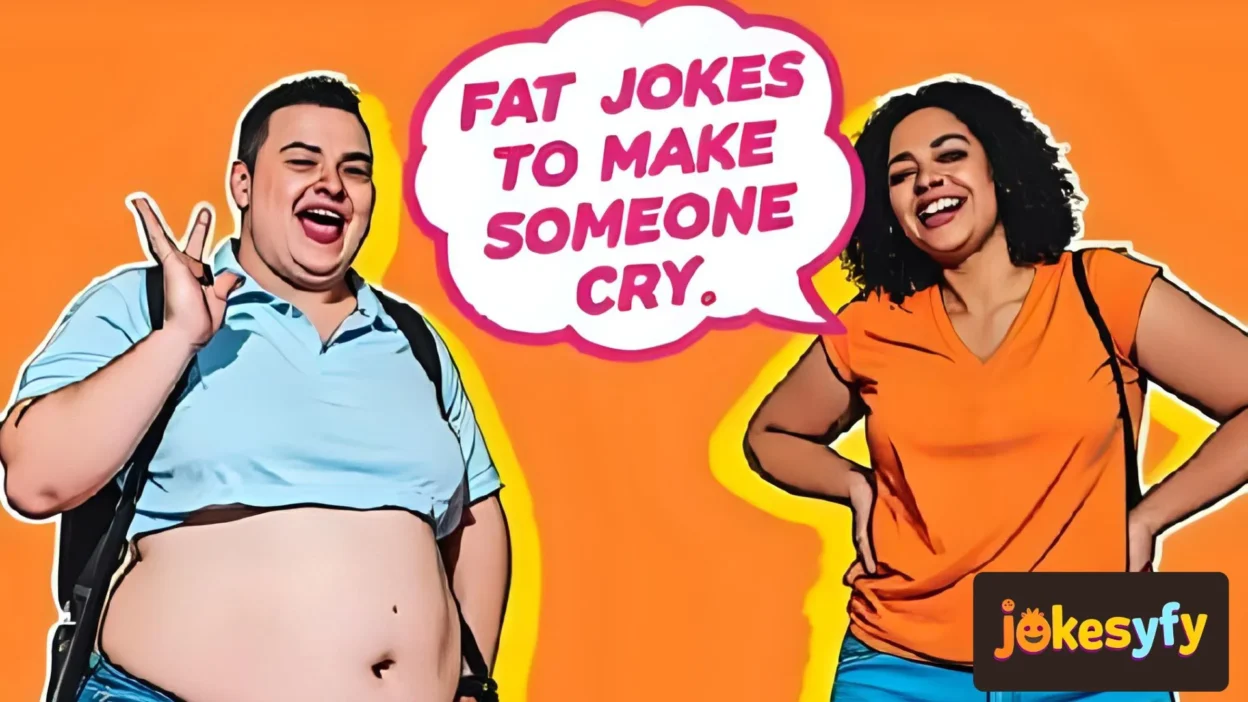We’ve all been there—that moment when a joke lands with a thud, and the laughter feels more like a wince. The quest for “fat jokes to make someone cry” reveals a deep, often uncomfortable truth about humor: it can be a weapon as much as a gift. This article isn’t just a list of brutal one-liners; it’s a deep dive into the power of words, the psychology of teasing, and how to navigate the complex world of weight-related humor without causing lasting harm. We’ll explore when these jokes cross the line, their real-world impact, and how to find laughter that uplifts rather than destroys.
Table of Contents
- The Psychology Behind the Punchline: Why “Fat Jokes” Sting
- The Fine Line: Humor vs. Harm in Weight-Related Jokes
- Fat Jokes to Make Someone Cry: A Critical Look at 15 Examples
- The Ripple Effect: How Hurtful Jokes Impact Mental Health
- Punching Up vs. Punching Down: The Ethics of Comedy
- Beyond the Scale: The Social Consequences of Weight Stigma
- The Rise of Body Shaming in Digital Culture
- From Hurtful to Humorous: Alternative Jokes That Don’t Harm
- The Role of Self-Deprecating Humor: When Is It Okay?
- Creating a Kinder Comedy Culture: What We Can All Do
- FAQ: Navigating the Complex World of Weight Humor
The Psychology Behind the Punchline: Why “Fat Jokes” Sting
At their core, “fat jokes to make someone cry” are rarely about playful teasing. They often stem from deep-seated cultural biases and anxieties around body weight . Research from the University of Connecticut has shown that weight-based teasing in adolescence is linked to long-term mental health issues, including depression and low self-esteem . When someone makes a joke about another person’s body, it’s often a reflection of societal stigma rather than harmless fun.
Dr. Linda Bacon, a renowned nutritionist and author of Health at Every Size, suggests that these jokes are a manifestation of cultural fatphobia . They reinforce the dangerous idea that a person’s value is tied to their size. The laugh comes at the expense of someone’s dignity, and the “punchline” can leave invisible wounds that last long after the laughter has faded. Understanding this psychological impact is the first step in recognizing why certain jokes can be so damaging.
The Fine Line: Humor vs. Harm in Weight-Related Jokes
Not every joke that mentions weight is inherently harmful. Context, intent, and relationship dynamics are everything. There’s a world of difference between:
- Self-deprecating humor: Where an individual makes a joke about their own body from a place of self-acceptance.
- Playful banter: Exchanged between friends who have established trust and mutual understanding.
- Punch-down jokes: Where the humor relies on targeting someone’s insecurities from a position of perceived superiority .
It’s the third category—the “punch-down” joke—that constitutes the “fat jokes to make someone cry” that people search for. These are designed to mock, shame, and belittle. The difference often lies in the power dynamic. As comedian Jon Stewart famously advocated, “Comedy should punch up, not down” . Making fun of someone for a characteristic they cannot easily change, and for which they are often socially marginalized, is punching down, and the emotional bruising can be significant.
Fat Jokes to Make Someone Cry: A Critical Look at 15 Examples
The following jokes are presented with critique and context to understand why they are hurtful, not as a tool kit for causing pain. They are examined to deconstruct their mechanics and highlight their potential for harm .
1. “You have more rolls than a bakery.”
- Why it stings: This joke dehumanizes a person by reducing them to a food item. It reinforces the lazy stereotype that heavier people are solely defined by their eating habits .
2. “When you step on a scale, it says ‘To be continued.'”
- Why it stings: This exaggerates a person’s body size to a ridiculous degree, suggesting they are too large to be measured. It turns a private moment of vulnerability into a public spectacle .
3. “You’re proof that gravity works overtime.”
- Why it stings: The humor here relies entirely on the punchline being about body mass. It lacks wit and creativity, serving only as a blunt insult about physics .
4. “You’re the reason they put ‘maximum capacity’ signs on elevators.”
- Why it stings: This joke implies the person is a public hazard or inconvenience. It’s deeply shame-inducing, suggesting their very presence creates problems for others .
5. “Your shadow weighs more than most people.”
- Why it stings: Using impossible exaggeration purely for mockery is a classic tactic of cruelty. It’s not clever wordplay; it’s meant to make the person feel abnormally large .
6. “You don’t do push-ups, you push the Earth down.”
- Why it stings: Similar to the gravity joke, this paints the person as a cartoonish figure of unnatural heaviness, denying their humanity .
7. “You sat on a quarter and made it a nickel.”
- Why it stings: This joke implies a person’s weight is destructive. It fosters a perception that their body can break or damage objects, which is both stigmatizing and dehumanizing .
8. “You’re like a human bean bag — soft and oversized.”
- Why it stings: This is infantilizing. Comparing a person to a piece of furniture reduces them to an object, dismissing their complexity and personhood .
9. “You use GPS to find your waistline.”
- Why it stings: The “humor” is framed around the invisibility of a body part, rooted in shame about one’s own physique. It can reinforce negative body image .
10. “You make sumo wrestlers look like ballerinas.”
- Why it stings: This joke compares a person to an extreme stereotype solely for ridicule. The goal is to make them feel like they are beyond a socially acceptable size .
The Ripple Effect: How Hurtful Jokes Impact Mental Health
The damage caused by “fat jokes to make someone cry” isn’t fleeting. Studies have consistently shown a correlation between weight-based teasing and serious mental health challenges. The Rudd Center for Food Policy and Obesity has found that this stigma is linked to depression, anxiety, and social isolation . When someone is repeatedly told, even in jest, that their body is a punchline, they can internalize that message.
This is especially potent for young people. Teens today navigate a world of “big back” jokes and “Ozempic allegations” on social media, where terms once used to appreciate bigger bodies are twisted into shaming tools for eating larger portions . This environment can normalize disordered eating and create a reliance on weight-loss drugs with unknown long-term effects, all in pursuit of a body standard that is unattainable for most without extreme measures . The joke that seems to last a moment can contribute to a lifetime of negative self-talk and unhealthy behaviors.
Punching Up vs. Punching Down: The Ethics of Comedy
The golden rule of ethical comedy is the direction of the punch. “Punching up” means directing satire at those in positions of power or privilege. This type of humor can challenge social norms and hold authority figures accountable. “Punching down,” however, targets marginalized groups or individuals based on characteristics like race, gender, disability, or body size .
“Fat jokes to make someone cry” are the epitome of punching down. They mock people who already face significant discrimination in employment, healthcare, and daily social interactions . Dr. Rebecca Puhl, Deputy Director at the Rudd Center, notes that “Jokes about someone’s body size can reinforce stigma, which is linked to real-world discrimination” . When comedy reinforces existing power imbalances and social prejudices, it ceases to be just fun and becomes a tool of oppression. The laughter it generates is often rooted in discomfort or a false sense of superiority, not genuine joy.
Beyond the Scale: The Social Consequences of Weight Stigma
The harm of these jokes extends far beyond hurt feelings. Weight stigma has tangible social consequences. A 2019 article on The Conversation highlighted that heavier people are 37 times more likely to experience employment discrimination . Women, in particular, are 16 times more likely to report weight-related employment discrimination than men .
These “jokes” contribute to a culture that makes this discrimination seem acceptable. They normalize the idea that larger bodies are legitimate targets for criticism and exclusion. This is evident in media portrayals, where, as writer Katelyn Burns points out, fatness is often used to make a character a joke or a monster, especially if they are also part of another marginalized group, like the transgender community . When the only representation someone sees of a body like theirs is negative, it shapes how society at large perceives and treats them.
The Rise of Body Shaming in Digital Culture
The digital age has amplified the reach and impact of body shaming. Trends on platforms like TikTok can quickly cycle through and misappropriate terms, turning them into weapons. The shift back to “heroin chic” or extremely thin body standards, promoted by celebrities and influencers, creates a hostile environment for those with different body types .
This has deadly consequences. The promotion of prescription drugs like Ozempic for off-label weight loss, amid nationwide shortages for diabetics, is a direct result of this toxic standard . When humor is used to enforce these standards—like preemptively calling oneself a “big back” to avoid being shamed for eating—it reveals a culture where self-deprecation is a defense mechanism against external cruelty . The quest for “fat jokes to make someone cry” is a symptom of this wider digital culture of shame.
From Hurtful to Humorous: Alternative Jokes That Don’t Harm
You don’t have to sacrifice humor to be kind. Brilliant comedy comes from creativity, wit, and relatability, not from causing pain. Here are alternatives that can generate genuine laughter without leaving someone wounded:
- Observational Humor: “Why do gym memberships feel like adult guilt subscriptions?” . This jokes about a universal experience, not a person’s body.
- Self-Deprecating Wit (about oneself): “I do marathons… of Netflix” . When directed at oneself from a place of security, it can be charming.
- Relatable Food Humor: “Trying to eat healthy is like dating someone who’s perfect on paper but boring in real life” . This connects people through shared struggles.
- Clever Wordplay: “I’m not big-boned, I’m just structurally sound — earthquake-proof, in fact” . This uses absurdity and intelligence rather than malice.
- Situational Jokes: Focus on funny, universal scenarios. For example, the joke about a man betting his wife that she wouldn’t lose weight, only to gain weight himself when she won . The humor comes from the twist of fate, not body shaming.
The Role of Self-Deprecating Humor: When Is It Okay?
Self-deprecating humor can be a double-edged sword. When used from a place of self-acceptance and confidence, it can be disarming and endearing. However, when it’s a preemptive strike against one’s own insecurities—like saying, “I’m such a big back,” before anyone else can—it often masks real pain and reinforces negative self-perception .
The key is consent and context. It is generally acceptable to make a joke about your own body, but it is almost never acceptable to make one about someone else’s without their clear and enthusiastic consent. Even then, be cautious. A culture where people feel they have to joke about themselves to fit in is not a truly inclusive or kind one.
Creating a Kinder Comedy Culture: What We Can All Do
Changing the culture of humor starts with individual choices. Here’s how we can all contribute to a more empathetic comedy landscape:
- Think Before You Joke: Ask yourself: Who is the target? What is the intent? Could this reinforce a harmful stereotype?
- Amplify Positive Humor: Share and celebrate comedians and content that are clever and inclusive without being cruel.
- Speak Up Gently: If a friend makes a hurtful joke, you can calmly say, “I know you didn’t mean harm, but that kind of joke can be tough to hear.”
- Embrace Universal Themes: Focus on humor about everyday life, awkward situations, and universal human experiences. These are the jokes that truly bring people together.
- Promote Diverse Body Representations: Support media that portrays people of all sizes in a positive, multi-dimensional light, moving beyond the stereotypes of the “joke” or the “monster” .
FAQ: Navigating the Complex World of Weight Humor
Q1: Is it ever okay to joke about weight?
A: It can be okay when it’s about your own body, done from a place of self-love and not self-loathing. Joking about someone else’s weight is almost always risky and should only be done if you have explicit, enthusiastic consent and a deeply trusting relationship. Context is everything .
Q2: What’s the best way to respond if someone tells a fat joke about me?
A: Defuse with confident humor if you can: “Yeah, I’m pre-eclipsed—darkening all your shine.” Then shift the topic. If you feel safe, you can also be direct: “I know you might be teasing, but comments about my body aren’t helpful to me” .
Q3: Are “yo mama so fat” jokes still acceptable?
A: These are classic roasts, but their acceptability depends entirely on the audience. In a playful, consenting group that enjoys this style of banter, they might pass. However, they inherently rely on “punching down” and can easily be perceived as cruel or outdated. It’s safer to choose more creative, less targeted humor .
Q4: Can fat jokes ever be positive or empowering?
A: Yes, but typically only when created and shared by people within the larger-bodied community as a way to reclaim narrative power. For example, self-aware memes like, “When your belly has its own gravitational pull” can be a way to find community and laugh at shared experiences, rather than being laughed at .
Conclusion: Humor That Heals, Not Hurts
The search for “fat jokes to make someone cry” is a pursuit of power through pain. True, connecting humor doesn’t need a victim. It comes from wit, shared humanity, and the ability to laugh at the absurdities of life—not at the shape of a person’s body. Words have immense power; they can isolate or connect, wound or heal. Let’s choose to craft jokes that build people up, that generate laughter which is light and free, not heavy with shame. Let’s leave behind the lazy jabs and embrace a comedy that connects us all, making humor smarter, kinder, and truly joyful for everyone. 😊

I am Charles K Baxter, a humor enthusiast passionate about spreading joy and positivity through laughter.




